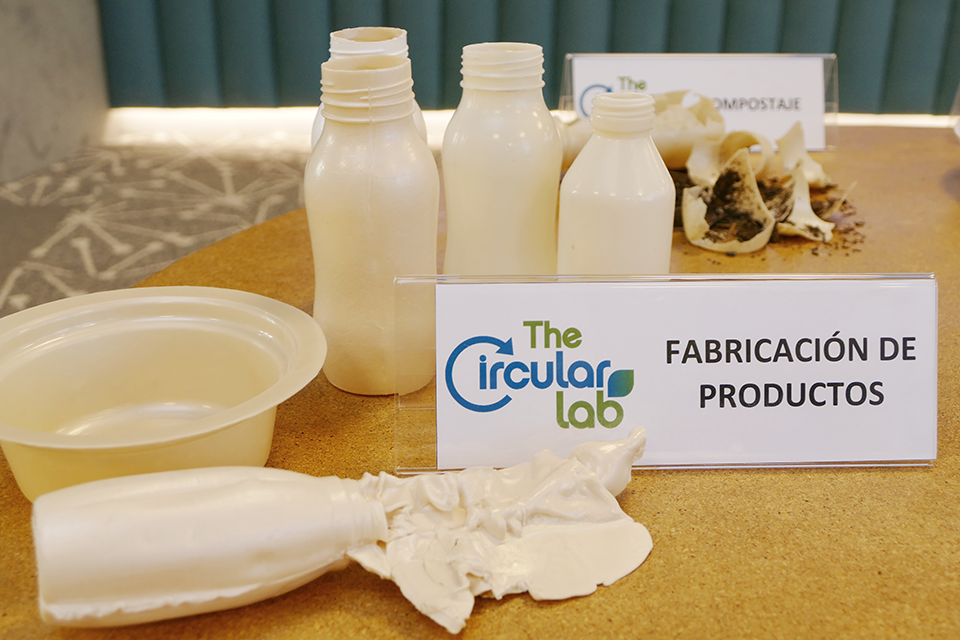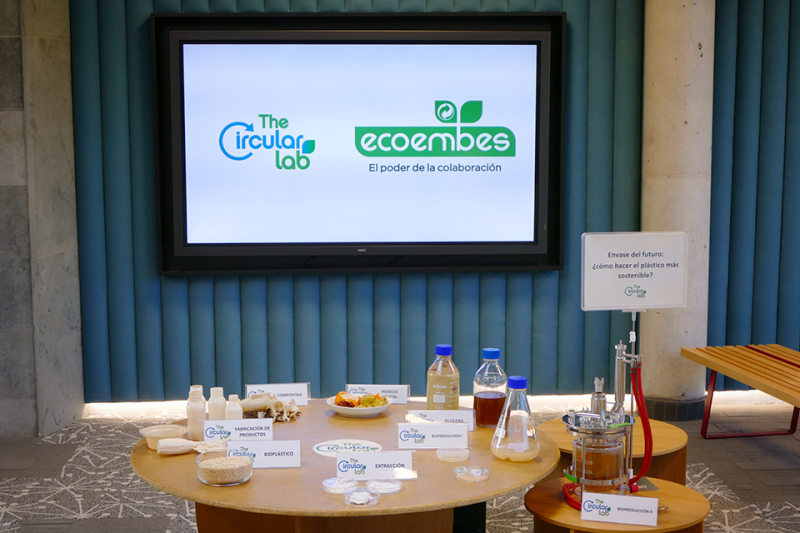
- This new material is obtained from plant waste (such as potatoes or carrots) and can be used to manufacture containers such as bottles or trays for food and beverages.
- It is one of the more than 100 projects in the field of circular economy that the Ecoembes innovation centre has launched in its first year and a half.
Aware of the environmental impact of waste on nature, and of the need to commit to prevention in all areas, TheCircularLab, Ecoembes’s centre for innovation in the circular economy, today introduced a new plastic material as part of its commitment to having increasingly sustainable packaging in the future. This material is biobased, meaning it is obtained from plant waste such as potato skins or any other plant waste, instead of petroleum, making it compostable, recyclable, and biodegradable in marine environments.
This sustainable plastic, which has been developed in concert with the AINIA technology centre and comes from 100% decomposing organic material, lays the foundation for an entire revolution in the field of circular economy. In addition, it could offer an alternative for treating waste from municipal markets and other facilities in which large quantities of this type of food are generated, thus helping not only to recycle this waste but to reduce food waste.
As for the process for obtaining this type of plastic, whose name is PHBV
(PolyHydroxyButylValerate) and which is in the prototype phase, it is obtained by grinding the plant waste and extracting the glucose from it, which then feeds a microorganism that is responsible for producing the biopolymer from which it is manufactured. Like plastics made from other non-plant sources, it could be used to package food and/or beverage products. But unlike them, in addition to being recyclable, it can be composted and it even biodegrades in marine environments.
More than 100 circular economy projects
TheCircularLab, Ecoembes’s innovation centre, presented this new plastic at an open house held today, where the 100+ projects it has developed over its first year and a half of existence were on display. The centre, a first in Europe and based on an ecosystem of open innovation, researches four areas of innovation: packaging of the future, smart waste (intelligent waste management), citizen science and entrepreneurship, through its start-up acceleration programmes. The ultimate goal is to promote the circular economy through recycling, of packaging in particular.
During its first year and a half, TheCircularLab has created an entrepreneurial ecosystem involving more than 200 external collaborators, 55 students (through the Circular Talent Lab programme for young, innovative talents) and a community of 20 entrepreneurs, selected from more than 150 from all five continents, and who are part of the start-up accelerator at the centre.
Thanks to this, in addition to the sustainable plastic created from plant waste, the centre has launched initiatives such as A.I.R-e, the first virtual recycling assistant (a chatbot that relies on machine learning services and that is already available to help users recycle through their mobile); the smartwaste platform, which relies on IoT (Internet of Things) and big data to optimize waste management; and a 4.0 plant, which uses robotics to sort waste.
Óscar Martín, the CEO of Ecoembes, said “we must leave behind the philosophy of producing, using and discarding and shift to a new, circular economy paradigm so that we can respond to environmental challenges such as climate change, pollution and efficient energy use. Because we don’t have a Planet B”. This is what TheCircularLab is committed to. It “has already launched more than 100 projects and an ecosystem with more than 200 institutions, companies and organisations, which provides the best proof that a more circular world is possible”.
Zacarías Torbado, coordinator of TheCircularLab, led the presentation of the innovation centre’s projects and emphasized the importance of innovation to achieving a more sustainable planet, explaining that “the new sustainable plastic is the seed for new developments based on circular design, and just one example of how packaging will be in the future”.

Source
TheCircularLab, press release, 2018-11-22.
Supplier
Share
Renewable Carbon News – Daily Newsletter
Subscribe to our daily email newsletter – the world's leading newsletter on renewable materials and chemicals









